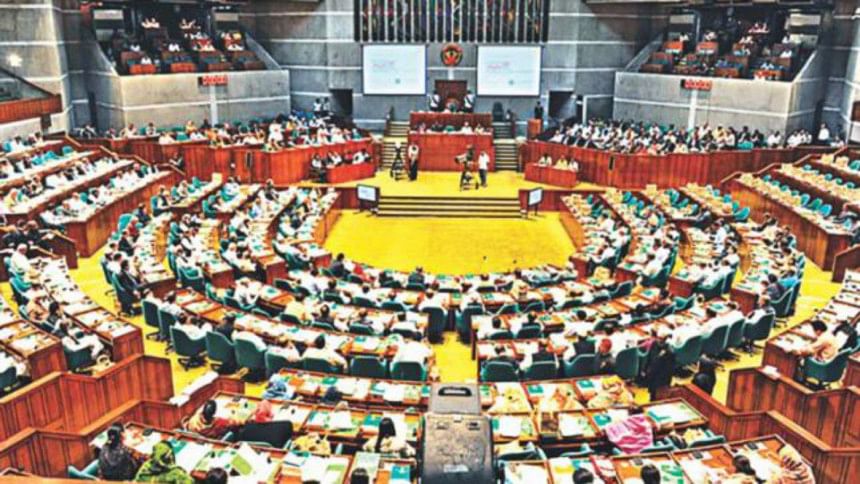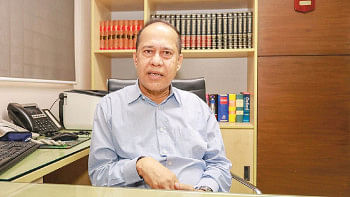BNP's hard choice: To join or not to join?

Understandably, the local leaders of the BNP are finding themselves in Hamlet's shoes having to decide on the next course of action as regards the five of its party men who created a unique record of getting elected, i.e. to join or not to join the parliament? The party is indeed in a sea of "outrageous misfortune" (some of it of its own making though). And it all depends on how the BNP acts to end their misfortune.
Very few would take issue with the view that politically BNP is in the doldrums, willy-nilly becoming politically inconsequential, if not a non-entity. For that, the BNP has to blame the lack of political acumen of its decision-maker, given the absence in the party of the collective decision-making culture that is the hallmark of any political party with democratic credentials. And it is not the chairman though but the aspirant to the highest post of the party who must bear, in good part, the responsibility for the state that the BNP finds itself in. Because it is to the virtual absentee landlord that the senior leaders in Dhaka have always turned to, seeking the final decision from a person who has been detached for a decade by thousands of kilometres from home and from the grassroots leaders and workers of the party, and unable to feel their pulse. And they have done the same this time too.
In fact, almost all the political decisions taken by the BNP in the last 10 years, except perhaps to participate in the eleventh parliamentary elections, have backfired badly on the party. Perhaps the single most injurious decision for the party was not that it boycotted the 2014 national polls but that it outsourced the violence, in most parts to the Jamaat, that was perpetrated on the hapless public.
The BNP should not rue the fact that it participated in the 2018 Jatiya Sangsad elections. In fact, that is one sensible decision that BNP has taken in a long time. It is another matter though that the expectations of the party and the hopes of the general people were blunted by the way the elections were held. There is, however, a qualitative difference between the conduct of the tenth and the eleventh parliamentary elections. In the former case, people abstained from voting in the remaining 147 seats that were not taken up "uncontested", some out of fear, but most out of their own volition. The actual percentage of votes cast in the tenth parliamentary elections may have just touched five, although the EC, after several days of trying to determine a plausible number, came up with a figure of around 51 percent to give the election a modicum of credibility. That did not fool the people. However, in the 11th parliamentary elections, voters in many centres were prevented from voting by various intriguing and innovative methods. The outcome of the elections, one understands, confronted even the senior leaders of the AL.
Since then, the BNP has been in a fix over whether or not its elected MPs should join the parliament. The matter has become more pressing since two Oikyafront candidates joined the parliament recently which the BNP denounced strongly, describing the act as cheating the nation.
Now that the ball is in Tarique Rahman's court, one would have to wait for the final pronouncement. Given the inflexibility displayed in the past on such issues, it would be interesting to see if he chooses to climb down from his high horse and decides on a rational approach. But it would do him well to consider certain ground realities.
Firstly, although nobody can or should write the BNP off, one cannot deny that it is in a moribund state. Except for some odd comments here and there, it has not come out strongly on any national issue that one expects from the second largest political party in the country.
Secondly, two of its senior personages are out of the political scene, a very unhappy situation for any political party. And such a situation may compel some of its members, in particular those who are politically committed, to choose to move away and towards other parties. It is quite likely too that they would find welcome arms of the other major party which may be only too eager to take them into its fold. We saw that happen just before the polls in 2018 when a large number of BNP members joined the AL, and that included a longtime presidium member.
Thirdly, and most importantly, given all of the above, a prolonged state of suspended animation or political limbo carries a serious prospect of the party becoming a political non-entity. And that is perhaps what some political parties would like to see happen.
What may possibly be playing in the minds of the BNP leadership is the fact that their joining the parliament might validate the election, the results of which the Oikyafront has rejected. That may well be true, but the BNP cannot overlook the fact that one's destiny cannot be left to chance; it is a matter of hard choice that will determine the future of the party. The BNP must choose between becoming completely irrelevant politically, if not a non-entity, and validating an election. For the BNP, that is a hard choice, but most often, a hard choice turns out to be the right choice.
Brig Gen Shahedul Anam Khan, ndc, psc (retd) is Associate Editor, The Daily Star.





Comments